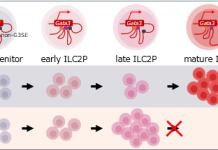
A dear friend and fellow mommy recently asked me if the winter weather made my eczema flare-up, as her daughter’s eczema has. I told her that heat and humidity were my Achilles heel for my eczema. Cold weather has always had a soothing effect on my skin (and my temperament). I advised her that everyone living with eczema has different reactions to stimuli, but it reminded me of my own experiences with eczema.
I have lived with eczema since I was a child. The debilitating itching and cracked, sometimes oozing, skin made for a somewhat uncomfortable childhood. I went through different rounds of medication to prevent me from scratching and heal the sores. I developed a “thick skin” for the inevitable stares and sneers from other children and adults. While I have written about my eczema experiences for college writing classes, I have never written about my experiences publicly. Thus, here is my eczema story in all its itching glory from its definition to the ugliness of flare-ups, and the importance of treatment.
What is eczema?
Eczema is “a condition that makes a person’s skin red and itchy. It is common in children but can occur at any age. It is long lasting (chronic) and tends to flare periodically. It runs in families with a history of eczema, allergies, hay fever or asthma.” It is also known as atopic dermatitis. For me, eczema runs on both sides of my family. Many of my cousins have eczema, or asthma, or a combination of both. My daughter Ilse’s pediatrician knows that I have eczema, as there is always a possibility that Ilse can develop the skin disease too. As a parent, I diligently check Ilse’s skin for dry, itchy patches, sores, or scratches that grow in size. Luckily, Ilse has not had any skin issues. We take itching seriously at home and keep several tubes of anti-itch cream, unscented lotions, and creams on hand at all times. I see my dermatologist quarterly and have a recommendation for a pediatric dermatologist, just in case.
Flare-ups
Itching and scratching usually precipitate a flare-up. A flare-up is a sudden itching, scratching irritation of the skin. Any number of stimuli can trigger flare-ups for people living with eczemas like allergies to fabrics, foods, animals or chemicals; stress; menstrual cycle; weather, etc. Up until recently, my flare-up triggers have been hot, humid weather, animal dander, aloe, my menstrual cycle, and stress. Last fall, I added soy products to this list after taking a skin patch allergy test. Exposure to any of these by themselves or sometimes together can cause me to itch furiously, leaving a trail of flaked scabs. It takes a serious, conscious effort to stop scratching. To prevent flare-ups, I rely on a daily oral dose of an antihistamine; I try to avoid my trigger stimuli as best as I can, and I keep anti-itch cream and lotion with me at all times. With the hot, humid weather, like our Indian summers in San Francisco, I dress in cool, loose clothing. Understanding what my flare-up triggers were helped me figure out the best way to treat them.
Treatment
The third part of living with eczema is treatment. Treatment is going to vary from person to person, based on the severity of the eczema condition. When I was a child, I went through rounds of medicated creams, because my skin was either red and oozing or dry and cracked. As an adult, I’ve been subscribed steroid shots to “jump start” my skin’s healing when patches on my upper thighs wouldn’t clear up. For me, the most important treatment for skin health is hydration inside and out. I try to drink at least half my weight in water every day. I moisturize my skin daily and frequently with CeraVe Cream. The cream can be found at every major retailer and is available via “Subscribe & Save” on Amazon. My dermatologist recommended it years ago, and my skin soaks it up. CeraVe is gentle enough for even Ilse to use. When I am hydrated, my skin does not feel so dry and is less itchy. I stay connected with my dermatologist via email and scheduled visits to discuss any skin challenges, like a resistance to certain medicated creams or, as was the case last year, a flare-up that would not heal. Lastly, when I can, I also try to keep stress to a minimum.
Living with eczema does not mean a person has to suffer from eczema. Understand the disease. Determine what stimuli trigger your flare-ups. Seek treatment from a dermatologist. Your skin will thank you.
For additional information about eczema, check out these sites.
Resources:
American Academy of Dermatology




















